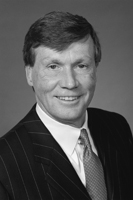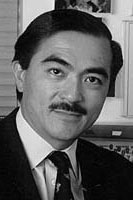“I applaud the courage, the wisdom, and the vision that the trustees who supported this complex issue have shown. Congratulations on a difficult job done well.”
“One of the most exciting things I've seen in 40 years as an alum has been the rise of four petition candidates to the board of trustees. I'm stunned that you've squashed the dissent of the alumni who've risen up.”
The forgoing comments of Allen Collins '53 and Curt Anderson '67, respectively, reflect the range of views

the Dartmouth College
Board of Trustees
expressed by alumni in a Boston forum with Dartmouth College Board of Trustees chair Ed Haldeman Jr. '70 and trustee Michael Chu '68 on the board's recent decision to expand from 18 to 26 members by adding eight charter trustees. The expansion has drawn alumni attention and some national media coverage for its departure from the traditional parity between the number of charter trustees, who are appointed by the board, and the number of trustees who are nominated and by alumni.
One hundred seventy-five alumni attended the forum, which was held in the Fairmont Copley Hotel on September 25, three weeks after the trustees announced the decision as part of an overall board restructuring plan.
Applause broke out often in a discussion that was by turns a Dartmouth love-in and a cross-examination. Representing every decade from the 1940s on, 15 alumni voiced opinions. Some commended the expansion as a tough, forward-thinking move; others railed against it, calling it a “dilution” of alumni power in trustee elections. One alumnus suggested the board should go still further and consider adding members who are not alumni. And a couple participants seemed moved mostly to share their Dartmouth experience. Judy Zodda, who identified herself as “only a parent” and drew laughter when she added, “who just pays the bills,” spoke fervently about the “amazing, amazing experience” that her son, Chuck, is having as a Dartmouth student and football player.
The forum was part of a communications effort by the board that includes meetings with alumni in Los Angeles, San Francisco, New York, Chicago, and Washington, D.C. “Our interest in meeting with alumni is in sharing the rationale behind our decision,” said Chu, “in the same way we all did as undergraduates in the classroom, when we didn't necessarily always agree with each other.” He added that the board's governance report “has been downloaded almost 10,000 times.”
The Board of Trustees Restructuring Plan
The restructuring plan also allows for the creation of bylaws; a vice chair; an executive committee; and committees on academics, student life, and alumni affairs—all changes that bring the Dartmouth board more in line with those of 30 peer institutions studied by the board's Governance Committee. But the part of the plan that's getting the most attention is the increase in the number of charter trustees without a concomitant increase in alumni-nominated trustees. Ending the longtime parity between the two types of trustees, the expansion will result in 16 charter trustees and 8 alumni-nominated trustees when completed in 2009.

The Dartmouth board will continue to have one of the highest percentages—31 percent—of alumni-nominated trustees in its peer group. The plan also preserves the Dartmouth tradition of allowing, for those seats, direct-to-ballot petition candidates as well as candidates chosen by the Alumni Council. But the board tasks the Alumni Council, whose job it is to present a slate of candidates when an alumni-nominated seat opens, and the Association of Alumni, which is responsible for carrying out elections, with revising the current election method, which was established in 1990 and has the council field three candidates in an approval-voting contest. The trustees have asked the two organizations to come up with a method more like the one in place before 1990, with the council fielding one or two candidates in a one-person, one-vote system.
Haldeman said he thought the start of his term as board chair in July presented “a reasonable time to look at governance issues, particularly how the election process for alumni-nominated trustees has changed in the recent past.” He cited the “increased politicization” of recent trustee elections, pointing out that in the latest, some candidates spent $75,000 or more on campaigning. This trend toward the “bringing of Washington into Hanover,” said Haldeman, “means a real reduction in the universe of people who can run.”
Concerned that a reduction in the pool of trustee candidates puts Dartmouth at a disadvantage, given the complexities of running a large organization in an increasingly globalized world, Chu said, that the first of the Governance Committee's four objectives was “to best prepare Dartmouth to face not only the present but the future.” They also wanted “to preserve the role of alumni in trustee elections, which is much greater at Dartmouth than at other institutions; to contain some of the negative aspects of the elections, and to increase board interaction with regard to academics, student life, and alumni affairs.”
Vox Clamantis in the Forum
Critics zeroed in on the shift away from parity. Several said that things are wrong at Dartmouth, though without specifying what, other than the recent struggles of the football team (mentioned by three alumni) and past changes to the ROTC program (mentioned by one). They said that alumni-nominated trustees are necessary for change, because the trustees and the Alumni Council are too close to the administration. “I don't believe you're all puppets of [President] Jim Wright, but I think you have to prove it,” said Bob Shirley '57, '58DMS.
“I can assure you that all the trustees who've been elected to the board have taken the job because they thought it best for Dartmouth, not because they're puppets” said Haldeman. “It's not easy for anyone on the board right now. We knew we'd be subjected to criticism with the board structure review. It's hard to imagine that anyone would want to endure this process out of some loyalty to the administration. The only reason someone would embark on this is that they love Dartmouth.”
Chu seconded this. “The board has never been composed of people in lockstep with the administration or with one another. Everyone has different views—that has been fundamental to the board. Since I joined the board, my experience has been that we all start at some end and come to the middle. I simply don't agree with every decision of the board. But when others in the group come to the same conclusion, I understand that it's for the enduring good of Dartmouth.”
Greg Jones '79 asked whether the board might change the plan to allow alumni to nominate some of the new trustees. “Future boards may change, but for this board, it's been decided,” said Haldeman. He noted other changes in the board's composition throughout its history, including resolutions that ended the requirements that all trustees be members of the clergy and New Hampshire residents.
Andrew Eastman '07 asked, “Why not trust alumni to determine the needs of the college and appoint candidates who meet them?”
“The alumni voice is important, and we'll continue to have the eight alumni-nominated seats,” Haldeman responded. “But the election process doesn't guarantee the range and diversity that the board needs if it is going to steward Dartmouth into the future. We want a small board, yet with the maximum diversity of ages, gender, race, and skills—expertise in real estate; in running large, complex organizations; in understanding the complexities of building finance” and other areas.
“For example, we don't have anyone on the board who's a member of a faculty of Arts and Sciences,” said Chu. “And I represent the only international interests, with my focus in Latin America. Yet the next 50 years are projected to bring the rise of the Pacific.” Chu is co-founder of the Ignia Fund, which deploys equity capital to high-growth enterprises originating in Latin America, and a senior lecturer at Harvard Business School, specializing in social enterprise and emerging markets.
James Booth '57 weighed in on the issue of diversity by first quoting the poet Maya Angelou: “History, despite its wrenching pain, cannot be unlived; however, if faced with courage, need not be lived again.” Booth, who is African American, said, “When I went to Dartmouth, there were three people in my class who looked like me. And even in this room now there are not many. I applaud the board for looking at history and working to correct that.”
Chandler Rosenberg '86 asked how alumni can recommend trustee candidates, and Chu said recommendations can be submitted to the board through the Alumni Council.
Communication to and from the board and the administration seemed to be an issue in general.
“I sense that although the College keeps close contact with the Alumni Council and class and club officers, it's lost touch with alumni as a whole,” said Bill McCarter '60. “The administration needs to beef up its PR to communicate to the entire alumni body. It has a responsibility to get the word out that Dartmouth is in the top ten and it doesn't need to be exactly what it was years ago.“
Collins, who has logged more than 50 years of volunteer service with Dartmouth alumni organizations—including both the Alumni Council and the Association of Alumni—said, "I'm excited about what this board is doing. I've been an advocate for change in the governance structure of the College for a long time. Some of us had hoped that alumni would work this out two years ago, but the trustees needed to come in. And Ed was the guy to do it. He managed the Putnam crisis, you know; he's got his head screwed on tight.” Haldeman is president and CEO of Putnam Investments.
“My hope is that the dust will settle quickly,” Collins said , “so we can turn our attention to the real issues that are so important to the College.” He cited the tuition structure, campus buildings, and economic planning as particular interests.
Andy Horne '87 closed out the meeting. After thanking the trustees “for showing the foresight to take action to bring about these needed changes,” he expressed umbrage at the suggestion that longtime alumni volunteers may be too close to the administration. Horne is president of the Dartmouth Alumni Club Officers Association and former co-president, with Andrea Lordan '86, of the Dartmouth Club of Greater Boston. He listed a number of alumni who, like him, have served alumni organizations and the College for many years, and he ticked off their service roles.
Then Horne said, “There is no room to criticize people who volunteer for the College. This is what the conversation has become? To anyone who's served as a volunteer for Dartmouth College, thank you!” His remarks drew a standing ovation, and the forum ended.
